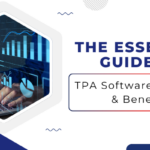Claims Software Systems: The Future of Smart Claims Handling
April 23, 2025
The evolution of big data has impacted numerous industries. And healthcare is no exception. Big data analytics can potentially transform how healthcare claims are processed and analyzed completely. Its integration into healthcare claims management software may improve operational efficiency, offer deep insights into patient care, and ease the shift to value-based care models.
This article will examine how big data might enhance patient outcomes, expedite operational procedures, and make claims processing more precise and effective.
Big Data in Healthcare
Big Data means a large amount of data produced by various electronic sources which has structured and unstructured data from numerous fields.
Health-related Big Data involves patient records, medical histories, insurance details, findings from clinical trials, and wearable devices, among others.
It has properties like volume, velocity, variety, and veracity. These properties make Big data useful in the health sector.
Healthcare Claims Management: The Importance of Big Data
In order to recover the expense of the medical services rendered, healthcare claims management includes submitting, reviewing, and settling patient insurance bills.
Over time, this has proved very intricate and time consuming. It often leads to certain shortcomings, subjecting it to inefficiency and inaccuracy problems.
Big data analytics can address such issues as instant data processing, prediction, and enhanced decision-making mechanisms.
Key Benefits of Leveraging Big Data in Claims Management Software
- Enhanced Data Accuracy and Consistency
- Better Fraud Detection and Prevention
- Optimized Operational Efficiency
- Personalized Patient Care
- Promotion of Value-Based Care Models
- Regulatory Compliance and Reporting
- Predictive Analytics for Proactive Care
1. Enhanced Data Accuracy and Consistency
Big data analytics enhances the precision and quality of claims data by collecting and examining data from numerous resources.
Therefore, inconsistencies can be found in Claims software such as billing and electronic health records (EHR) technologies while ensuring correct information and maintaining database uniformity.
As a result, there will be fewer mistakes during submission and fewer denials resulting from wrong number entries.
Key Points:
- Data Integration: To ensure that claims processing receives comprehensive and accurate information, you must combine data from different sources.
- Error Detection: Advanced algorithms can use complex mathematical formulas to identify and correct inconsistencies and errors in the data related to claims processing.
- Consistency: This guarantees data consistency across several systems, decreasing mistakes caused by human entry and raising the standard of data overall.
2. Better Fraud Detection and Prevention
Healthcare fraud is a concern, as it involves significant financial losses. Big data analytics can greatly benefit fraud detection and prevention.
Advanced algorithms, which can look for strange behavior or patterns in claims data, have the potential to detect suspicious actions that should be investigated further and possibly mark them as fraud cases.
Such proactive measures help to guard against falling prey to traps laid by fraudsters while at the same time curtailing economic implications through declined cases of financial scams.
Key Points:
- Pattern Recognition: It spots unusual patterns in claims data indicating fraudulent activity.
- Anomaly Detection: It raises flags on inconsistencies found within claims submissions, which would warrant further scrutiny
- Predictive Modeling: Based on past occurrences, it can forecast what forms of fraud may occur and prevent them.
3. Optimized Operational Efficiency
AI improves the organization of events by executing the usual duties and enhancing streamlining methods. It leads to faster operation performance, minimizing administrative workload and decreasing functional costs.
By scrutinizing functional data, it is possible to unravel medical establishments’ blocking points, distribute resources rationally, and increase the company’s total productivity.
Key Points:
- Automation: It can handle many recurring tasks like typing and validating information, thus reducing the necessity for human intervention
- Workflow Optimization: It investigates the movement of work inside an organization to remove obstacles caused by various factors.
- Resource Allocation: It helps put resources in the right place by using information from data-oriented research.
4. Personalized Patient Care
Healthcare professionals use big data to offer unique medical services, considering information that defines the needs of every other patient and their responses to treatment.
By analyzing claims data and clinical information, caregivers can recognize patterns, shape therapeutic approaches, and increase the quality of patients’ lives.
It is important to note that this personalized treatment improves client contentment and minimizes rehospitalization and other negative outcomes.
Key Points:
- Patient Insights: Patient histories, views, and treatment outcomes are provided comprehensively.
- Tailored Treatment Plans: Individualized treatment plans can be tailored more effectively using patient-based evidence
- Outcome Improvement: Enhances patient outcomes through personalized care strategies.
5. Promotion of Value-Based Care Models
Value-based care prioritizes patient outcomes and the standard of care over the volume of services provided. Big data analytics, which offers information on patient happiness, quality, and performance, encourages this approach.
Claims management software is one-way such data can be employed to align payment policies in this direction.
Key Points:
- Performance Metrics: It monitors and tracks cardinal performance indicators (KPIs) pertinent to patient treatment outcomes and the quality of health services.
- Outcome-Based Reimbursement: This aligns its reimbursement strategies with the principles of value-based care.
- Quality Improvement: It helps determine the error spots in patient care and operational streams.
6. Regulatory Compliance and Reporting
Healthcare organizations must navigate a complex regulatory landscape by observing local and federal state rules and regulations.
Big data analysis tools make regulatory compliance easier by enabling them to report extensively, monitor regulatory requirements at all times.
And these tools identify failure in advance so that any prevention can occur. This enables them to deliver quality healthcare services without legal or financial problems.
Key Points:
- Regulatory Monitoring: It continuously checks whether regulations are respected.
- Comprehensive Reporting: It prepares elaborate reports to show compliance efforts
- Risk Mitigation: It establishes and deals with potential compliance risk issues from a forward-looking perspective.
7. Predictive Analytics for Proactive Care
Predictive analytics for healthcare claims management can identify patients who might develop chronic illnesses, manage demand fluctuations in claims volume, and optimize resources accordingly.
This proactive step aids medical caregivers in implementing prevention measures while improving patient care.
Key Points:
- Risk Identification: It discerns patients who might have poor health outcomes for timely intervention
- Claims Forecasting: It anticipates future claims to come up with the optimum resource arrangements
- Preventive Measures: It facilitates the practice of preventative care mechanisms to enhance patient results.
Challenges and Considerations
Despite challenges and considerations surrounding its utility, big data benefits healthcare claims administration. The challenges are as follows:
1. Data Privacy and Security
Safeguarding patients’ non-disclosable data at all times is very important. Healthcare organizations must implement strong security measures, including encryption, access controls, and adherence to data protection legislation such as HIPAA.
Key Points:
- Data Encryption: During transmission and storage, patient data is made secure.
- Access Controls: Only authorized personnel have access to this information
- Regulatory Compliance: Follows data protection rules that protect patient privacy.
2. Data Integration and Interoperability
Combining data from various sources poses problems because data formats, standards, and systems differ.
Standardizing protocols and classes can make data exchange work seamlessly across all countries where these interventions are utilized.
Key Points:
- Standardized Protocols: Adopts industry standards for data exchange and integration.
- Interoperability: Enables seamless data transfer between many platforms and systems.
- Promotes Collaboration: Encourages interaction between technology suppliers, insurers, and healthcare providers.
3. Data Quality and Management
Effective data must be correct and of high quality to improve big data analytics.
Healthcare companies must adopt data governance frameworks to guarantee the correctness, consistency, and integrity of their data.
Key Points:
- Data Governance: Establishes policies and processes for data management and quality control.
- Data Validation: Implements processes to verify and clean data to ensure accuracy.
- Quality Control: Continuously tracks and improves data quality.
4. Technical Expertise and Resources
Companies need highly specialized technical know-how and the necessary resources to perform big data analytics.
Medical organizations must invest in an experienced workforce and sophisticated tools to use big data beneficially.
Key Points:
- Skilled Personnel: Hiring or training experts in healthcare IT and big data analytics.
- Advanced Technologies: Investing in advanced data analytics technology and tools.
- Ongoing Training: Continuous training to update the team on recent advances.
Conclusion
Big Data Analytics integration with healthcare claims management software poses a game-changer strategy to improve operational efficiency, enhance patient outcomes, and promote value-based care models.
This enables healthcare businesses to use big data proactively, improve data accuracy, and obtain deeper insights into patient care.
The benefits of big data analytics in claims management are more than sufficient to improve the healthcare system’s efficiency, accuracy, and patient-centeredness, notwithstanding the obstacles that must be overcome.
Substantial analytics integration is critical to the healthcare industry’s future growth for organizations hoping to stay competitive and deliver excellent patient care. To achieve this, all parties involved in this industry must provide adequate data control procedures, foster cooperation, and invest in new technology.
How Health Claims Management Software Transforming The Industry?
February 7, 2025How Claims Software Can Transform Your Claims Process?
January 29, 2025The Need For Healthcare Claims Management Software
January 13, 2025Reasons You Should Invest in Claims Management Software
January 7, 2025The Essential Guide To TPA Software Features & Benefits
December 24, 2024Claims Management Software: Key To Streamlining Your Business
December 18, 2024How TPA Software Solutions Transformed Medical Claims Management?
November 20, 2024









